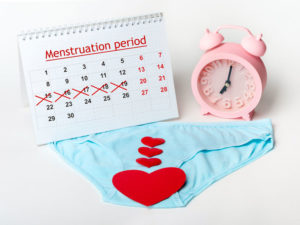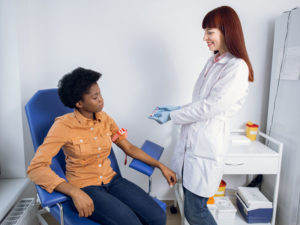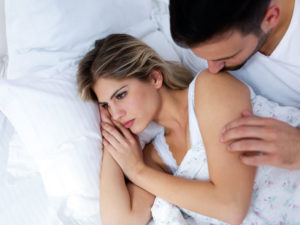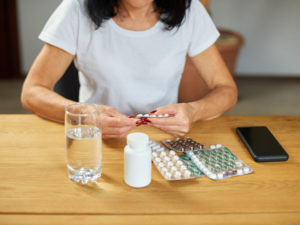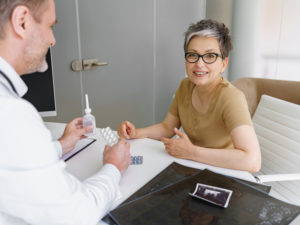
If you’re a woman, you’ve certainly heard of polycystic ovary syndrome (PCOS) at least once in your life, as this common hormonal disorder affects about 1 in 10 women of reproductive age.
While PCOS is widely recognized for possibly causing irregular periods, acne, and fertility issues, there’s an aspect of this condition that often goes undiscussed – its connection with libido and female sexual dysfunction. In this article, we’ll delve into the connection between PCOS and female sexual function, exploring the physiological and psychological factors that may contribute to a decreased sex drive in women with PCOS.
Keep reading to find out anything from PCOS symptoms to diagnosis, lifestyle changes, and treatments, including BHRT as an effective solution to restore your hormonal balance and reclaim optimal sexual function and libido.
What is PCOS? From Main Symptoms to Diagnosis
Reasons for Decreased Libido in Women with Polycystic Ovary Syndrome
Hormone Therapy for Low Libido: BHRT to the Rescue
What is PCOS? From Main Symptoms to Diagnosis
As mentioned, polycystic ovary syndrome is a common health disorder affecting women of reproductive age.
While the exact cause of PCOS is not fully understood, studies suggest that a combination of genetic and environmental factors may cause hormonal imbalance and trigger the excessive production of androgen hormones.
You’ll probably know if you’re part of the 6-10% of women who suffer from PCOS, because some symptoms are quite typical and include the following.
Symptoms of PCOS
Irregular menstruation
If you never know when your period will show up or if the intervals between one cycle and another are long or unpredictable, there’s a chance you may have polycystic ovary syndrome.
Hyperandrogenism and physical changes
One of the hallmarks of polycystic ovary syndrome is elevated levels of androgens. These are hormones present in both men and women but with higher concentrations in men. This means that if you’re a PCOS woman, your hormonal harmony is gone, and you’ll feel it in your sexual function.
Unfortunately, this hormonal imbalance can lead to other physical symptoms such as hirsutism (excessive hair growth in typically male-pattern areas), acne, and baldness.
Ovulatory dysfunction and infertility
Many women with PCOS have difficulty ovulating regularly, which can affect fertility and contribute to irregular menstrual cycles.
Polycystic ovaries
When you have PCOS, your ovaries don’t look the same as healthy ones due to an excessive number of follicles – or immature eggs.
So, despite what the name suggests, it’s not because you were diagnosed with PCOS that you necessarily have cysts in your ovaries.
What might look like cysts on medical imaging are often these small follicles that accumulate in the area, giving your ovaries a “polycystic” appearance – which can also affect female sexual function and fertility.
Insulin resistance
In addition to these primary signs and symptoms, polycystic ovary syndrome can also interfere with your metabolism, causing insulin resistance. This, in turn, can lead to an increased risk of type 2 diabetes and cardiovascular problems.
Diagnosis of PCOS
The diagnosis of polycystic ovary syndrome is based on clinical and hormonal correlations established by medical organizations. The set of criteria most used is the Rotterdam criteria, which requires the presence of at least two out of three features to determine PCOS:
- Ovulatory dysfunction or anovulation.
- Clinical and biochemical signs of hyperandrogenism.
- Polycystic ovaries on ultrasound.
That means there is no single test to diagnose the condition, so your healthcare professional will use a comprehensive approach to evaluate your symptoms and medical history. These may include:
- A review of your menstrual history.
- Signs of hyperandrogenism, including hirsutism, acne, and baldness.
- Laboratory tests to measure hormone levels, including testosterone, luteinizing hormone (LH), follicle-stimulating hormone (FSH), and anti-Müllerian hormone (AMH).
- Blood tests to measure glucose and insulin levels.
- Pelvic ultrasound to examine your ovaries.
- Investigation of thyroid or adrenal disorders to rule out any other health condition that may affect your hormone levels.
If you suspect you have PCOS or are experiencing decreased sexual drive or other symptoms, schedule a consultation with your healthcare professional.
At Nava Health, our team of functional medicine doctors specializing in bioidentical hormone replacement therapy (BHRT) can thoroughly evaluate your health to uncover the root causes of your symptoms – and then manage them with a personalized plan based on your individual needs.
If you’re ready to book your consultation, click here. But if you want to understand low libido PCOS and find out how to manage this issue, keep reading.
PCOS and Decreased Libido
Now that you know PCOS’s main symptoms, is low libido on this list? Does PCOS cause low sex drive?
And the answer is yes. Although symptoms may vary from person to person, polycystic ovary syndrome can potentially affect female sexual function and libido because the condition is directly linked to your sex hormones. It only takes a simple hormone imbalance to disrupt your whole body’s harmony – including your sex life.
As mentioned, one of the hallmarks of polycystic ovary syndrome is the disruption in the normal regulation of reproductive hormones. This causes elevated levels of androgens and imbalances in other hormones, such as estrogen and insulin – estrogen and libido walk hand in hand!
But you don’t need to settle for that. After all, life is too short for low sexual drive. So, let’s dive deep into the connection between PCOS and sex drive before showing you some solutions to restore your sexual function and desire.
Reasons for Decreased Libido in Women with Polycystic Ovary Syndrome
If you’re a PCOS woman and have ever wondered why you’re never in the mood for sex or – even worse – have settled for a lifetime without sexual arousal, you’re not alone.
Unfortunately, polycystic ovary syndrome can significantly affect your quality of life and your sexual satisfaction. This is due to its psychological and physiological characteristics, including obesity, hyperandrogenism, and other symptoms that may trigger body image issues, depression, and frustration.
Some studies even suggest that women with polycystic ovary issues suffer from sexual dysfunction as a comorbidity due to their difficulty in having genital sexual arousal, desire, lubrication, orgasm, and satisfaction.
The fact is that the connection between PCOS and low sex drive is real and may be influenced by at least five different factors.
1 Hormonal Imbalances
Higher-than-normal levels of androgens in females don’t necessarily lead to increased sexual desire. In fact, the overall hormonal imbalance, including the ratio of androgens to estrogen and progesterone, can have the opposite effect, causing female sexual dysfunction and a decrease in sexual drive.
2 Menstrual Irregularities
Irregular menstrual cycles and anovulation (lack of regular ovulation) in PCOS can impact the hormonal fluctuations that occur during your menstrual cycle. Changes in estrogen and progesterone levels, and the absence of regular ovulation, may contribute to low sexual desire.
3 Body Image Concerns
Some physical symptoms of PCOS, such as hirsutism, acne, and weight fluctuations, can affect body image and self-esteem. This may influence your comfort and confidence in intimate situations, contributing to changes in libido.
4 Psychological Distress
Dealing with the symptoms of PCOS, concerns about fertility, and the potential impact on self-esteem can contribute to psychological stress and anxiety. If you’re trying to get pregnant, uncertainty can become a real burden.
There is even research that suggests that women with PCOS may be at an increased risk of depression and anxiety due to the interplay of physical symptoms, hormonal imbalances, and the potential impact on fertility.
And, of course, mental health plays a crucial role in sexual function in women, so emotionally stressed women tend to experience decreased sexual drive.
5 Medications and Treatments
Some medications that manage PCOS symptoms, such as hormonal contraceptives or anti-androgen medications, may have side effects that affect sexual desire.
Despite the general connection between polycystic ovarian syndrome and sexual arousal, women with PCOS may have diverse experiences. In addition, factors unrelated to PCOS, such as relationship dynamics, stress, or other health conditions, can also influence sexual desire.
Now, let’s get into what really matters: how to deal with this.
Managing PCOS and Low Libido
Managing PCOS requires a comprehensive and integrative approach that includes:
- Lifestyle changes, such as maintaining a healthy diet, managing stress, and exercising regularly.
- Medications to address hormonal imbalances and specific symptoms – like low sex drive.
- Fertility treatments for women struggling to conceive.
- Managing long-term health risks, such as diabetes, thyroid dysfunction, and cardiovascular disease.
But let’s focus on restoring sexual function in women to achieve more sexual desire and get all the benefits of a healthy sexual life. This requires addressing both the physical and psychological aspects of the condition.
So, here we’ll list some general strategies you may find helpful. However, it’s crucial to consult your healthcare professional for personalized advice based on your individual needs and circumstances.
Strategies To Help Address Low Libido Due to PCOS
Address Hormonal Imbalances
After consulting with your healthcare provider, they may prescribe medications, such as hormonal contraceptives or anti-androgen medications, to help manage hormonal imbalances associated with PCOS, as balancing hormones could positively impact your libido.
At Nava Health, we specialize in bioidentical hormone replacement therapy (BHRT) to restore your hormonal balance – a safe, natural, and individualized approach. Learn more about BHRT below.
Lifestyle Modifications
Adopting a healthy lifestyle can positively influence both PCOS and libido. This includes maintaining a balanced diet, engaging in regular physical activity, and managing stress. Weight management may also be necessary, as excess weight can exacerbate symptoms and trigger self-esteem concerns.
Counseling or Therapy
Seeking the support of a counselor or therapist to address your psychological concerns can also help you manage low sexual desire. Therapy can provide coping strategies, improve body image, and address relationship dynamics.
Communication with Your Partner
Discussing concerns, feelings, and expectations with your partner can foster understanding and support. Consider involving your partner in the process of managing polycystic ovary syndrome and its impact on your sexual health.
Explore Intimacy
Focus on intimacy beyond sexual activity, including emotional connection, affectionate gestures, and spending quality time with your partner. This can help improve sexual desire.
Self-Care and Stress Management
Practice self-care to reduce stress. Stress negatively impacts your libido. You can manage your stress by engaging in activities that bring joy, relaxation, and balance.
Education and Empowerment
Educate yourself about PCOS and its management. Understanding the condition can empower you to make informed decisions about your health and seek the support you need.
Support Groups
Joining a support group or community of individuals with PCOS can provide a sense of understanding, shared experiences, and practical advice.
Regular Check-ups
Maintain regular check-ups with your healthcare provider to monitor your PCOS and discuss any changes in symptoms or concerns about libido.
Remember that managing PCOS may involve trial and error to find what works best for you. Healthcare professional guidance and tailored interventions are essential for positive outcomes.
Hormone Therapy for Low Libido: BHRT to the Rescue
BHRT offers a natural and effective solution to boost libido, improve mood, and revitalize sexual health. That’s because BHRT uses hormones structurally identical to those your body naturally produces, and these can be tailored to meet your individual hormonal and sexual needs.
Here’s why BHRT with specific hormones (estrogen, testosterone, DHEA, and progesterone) may be just what you need to solve your hormonal imbalance and sexual problems associated with PCOS.
Estrogen: BHRT with estrogen may help improve vaginal lubrication and reduce discomfort during sexual intercourse, which can be beneficial for women with polycystic ovary issues experiencing dryness or discomfort.
Testosterone: BHRT with testosterone can potentially improve sexual function and sexual arousal, helping to address low sexual drive in women with polycystic ovary problems.
DHEA (Dehydroepiandrosterone): DHEA supplementation helps to support hormonal balance and, indirectly, sexual function in women.
Progesterone: Progesterone is often used in combination with estrogen in BHRT to provide a balanced approach, as it helps counteract the potential risks associated with estrogen use.
At Nava Health, we offer BHRT based on your specific health profile, targeting the underlying causes of your symptoms with regular monitoring and follow-ups to ensure the effectiveness of the therapy and the management of any potential side effects or risks.
Additionally, we create a personalized health plan to help you cope with PCOS, including lifestyle and nutritional guidance and psychological support in conjunction with your hormone therapy.
PCOS and Low Libido – Revitalize Your Sex Life with Nava
Don’t let PCOS affect your sexual satisfaction and impact your overall wellbeing! Restore your sexual function and experience a renewed sense of vitality with Nava Health’s specialized approach to addressing PCOS-related challenges. We’re dedicated to helping women with polycystic ovary reclaim optimal sexual health.
At Nava Health, we understand the connection between hormonal harmony and sexual function. So, our tailored approach, specializing in BHRT, will optimize hormonal levels to reignite passion and enhance the overall quality of life of PCOS women.
Whether you’re seeking support for PCOS-related challenges or aiming to enhance your sexual function and libido, we’re here to guide you with personalized care.
Schedule your consultation today.

A Medical Director, and one of the first physicians to join the Nava Health & Vitality Center, Dr. Douglas Lord has made significant contributions to our Center and its founding principles. Dr. Lord has helped develop and implement the Nava Method™—Nava’s proprietary approach to total body wellness. He has also been instrumental in liaising with other expert practitioners to successfully implement Nava’s range of therapies, treatments, and products.
